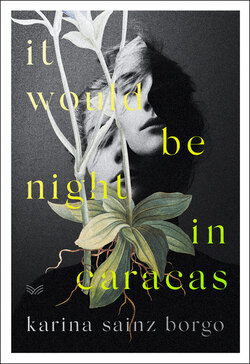Читать книгу It Would Be Night in Caracas - Karina Sainz Borgo - Страница 12
ОглавлениеI TOOK STOCK of our home library. On some of the books’ covers I could see the colored circles that for so many years, bored and with no parks to play in, I made while my mother imparted her lessons on “subjectverbpredicate.” Told not to leave my room, I equipped myself with an armful of books. Sometimes I read from their pages, at other times I only played with them. I unscrewed the lids of the tempera paint pots and pressed them against the bound pages at random: an orange ring for In Cold Blood to match the butane color of its cover; yellow, the color of little chicks, for The Autumn of the Patriarch to bring out the mustard of the design; burgundy in the case of For Whom the Bell Tolls. Almost every book bore a circular mark, as if I’d branded each before returning them to their shelves so they could graze quietly and at ease. Why didn’t those marks fade with the passing of time when all our transgressions remain? I wondered, The Green House in hand.
Next, I opened my mother’s wardrobe. I found her size 36 shoes. Arranged in pairs, now they had the air of a platoon of tired soldiers. I inspected the belts that once showed off her slim waist, and the dresses on their coat hangers. None of her things were garish or over the top. My mother was a fakir. A discrete woman who never cried and who, whenever she gave me a hug, created a paradise around me, a second womb scented with nicotine and moisturizer. Adelaida Falcón smoked and took care of her skin in equal measure. In the university residence hall for young ladies, where she spent five years of her life, she learned both to groom herself and to smoke. From then on, she never stopped reading, gently applying face cream to her cheeks, or quietly drawing on her cigarettes. Those were her happiest days, she often said. Every time she voiced those words, a question burned within me: Had the years she’d lived with me by her side put an end to the good times of her youth?
I rummaged around in the back of the wardrobe until I found the blouse of hers that was covered in monarch butterflies. Black and gold sequins were sewn all over it. I’d always loved it to bits. Whenever I removed it from the hanger and held it in my hands, the few square meters of the world my mother and I inhabited were suffused with wonder. The blouse was a swanky version of the glittery cocoons I dreamed about. Magical clothing, made of otherworldly color and fabric. I spread it out on the bed, asking myself why my mother bought it when she never slipped it on.
“How can I step out in that at eight in the morning?” she would say if I suggested she wear it to a PTA meeting. No matter how much I begged, she never went to a meeting wearing the blouse.
I studied at a school run by nuns, a stand-in for a more prestigious institution that wouldn’t take me because, at the interview, the principal learned that my mother wasn’t married and wasn’t a widow either. And although she never said anything to me about the incident, I came to understand it as symptomatic of the congenital disease that in those years afflicted the Venezuelan middle class: the defects of nineteenth-century white Venezuelans grafted onto the chaos of a mixed-race society. A country where women birthed and brought up children on their own, thanks to men who didn’t even bother pretending that they were stepping out for cigarettes when they decided to leave for good. Acknowledging this, of course, was part of the penance. The stumbling block on the steep ladder of social ascent.
I grew up surrounded by the daughters of immigrants. Girls with dark skin and light eyes. A summation, centuries in the making, of a strange and mestizo country’s practices in the bedroom. Beautiful in its derangements. Generous in beauty and in violence, two of the qualities that it had in greatest abundance. The result was a nation built on the cleft of its own contradictions, on the tectonic fault of a landscape always on the brink of tumbling down on its inhabitants’ heads.
Though less exclusive, my school likewise levied restraint on a society that was a long way from having it. In time, I understood that place as the breeding ground for a much greater evil, the natural resource of a cosmetic republic. Frivolity was the least egregious of its evils. Nobody wanted to grow old or appear poor. It was important to conceal, to make over. Those were the national pastimes: keeping up appearances. It didn’t matter if there was no money, or if the country was falling to pieces: the important thing was to be beautiful, to aspire to a crown, to be the queen of something … of Carnaval, of the town, of the country. To be the tallest, the prettiest, the most mindless. Even now, amid the misery that reigns in the city, I can still make out traces of that defect. Our monarchy was always like that: it belonged to the most dashing, to the handsome man or the great beauty. That’s what the whole thing that swelled into the cataclysm of vulgarity was about. Back then, we could get away with it. Our oil reserves paid the outstanding accounts. Or so we thought.
